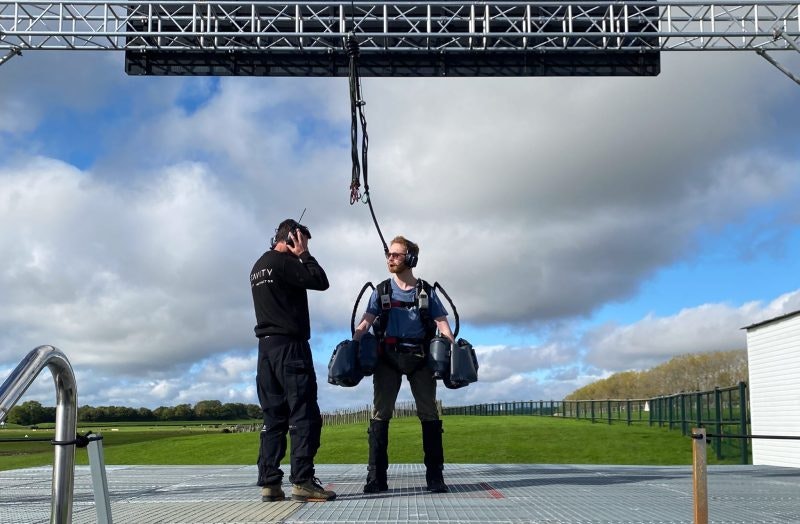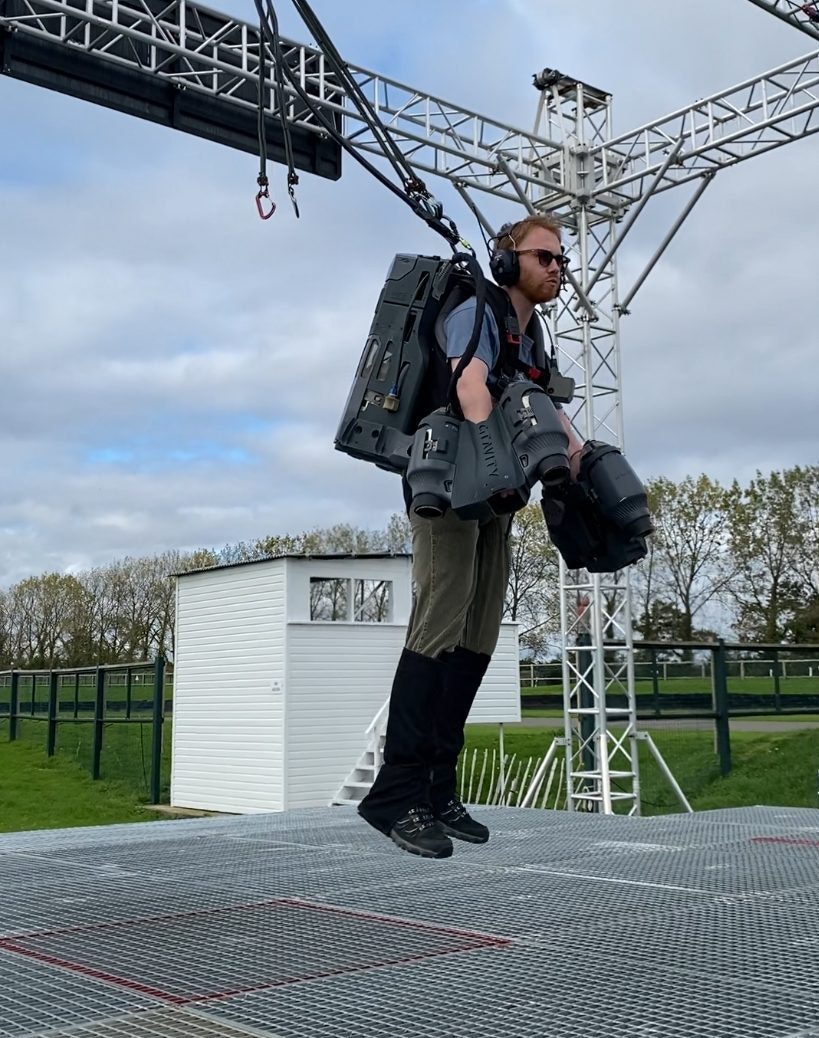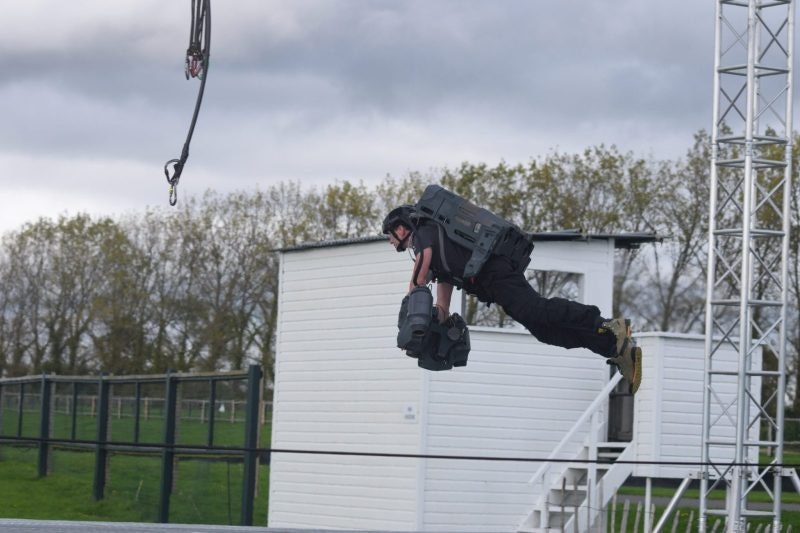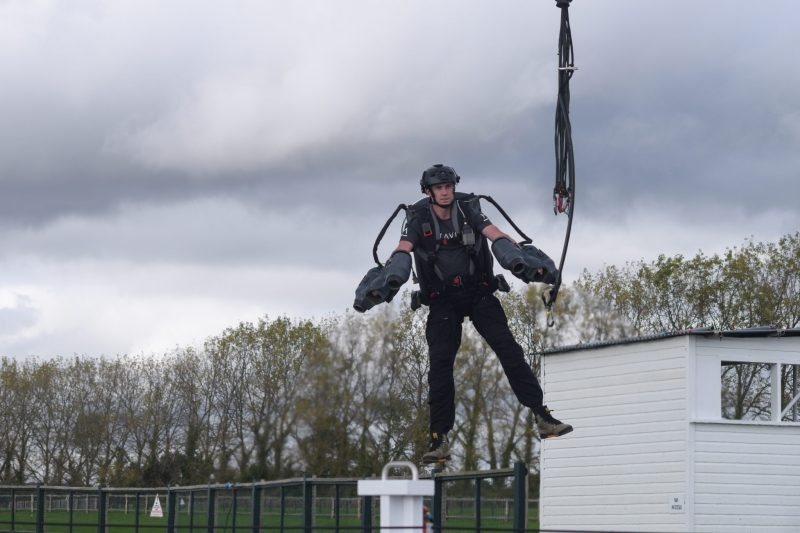The sound of the seven jet engines would be deafening if I wasn’t wearing ear protectors. As they warm my legs, I’m lifted into the air and hang there for a few seconds with my lower half dangling limply like an insect in flight. Then the 1,500 horsepower gets the better of me and I drop back to earth.
I’ve just “flown” in a jetpack. Fist pumps from my instructor follow as I’m unclipped from the metal gibbet I’m tethered to — a necessary safety precaution to stop novices like myself from blasting into the stratosphere.
I’m one of around 600 people who’ve taken flight in UK startup Gravity’s jetpack, or “jet suit” as the company calls it. Most of the others have been wealthy individuals who’ve paid thousands of pounds for seconds of airtime as part of a flight “experience” at the startup’s training facility at Goodwood Estates in the south of England. (I’m there courtesy of Gravity for a half-day jetpack experience, but there are a couple of others who’ve coughed up cash to attend).
It’s a revenue stream that founder Richard Browning says will eventually be dwarfed by another source of income: military contracts.
He tells me the company is close to inking deals worth “tens of millions of dollars” over the next 18 months to deploy jetpacks with two countries’ armed forces. More could be on the way in the next couple of years.
Investors — for whom defence is the latest FOMO sector — have seen potential, too. Gravity has just closed a $13.3m Series B, following on from a $6.1m round last year. It counts Draper Associates (a backer of autonomous vehicle company Cruise and bitcoin wallet Coinbase) on its cap table.
But, as Browning tells me, getting funding and commercial deals for a product that has rarely left the realms of science fiction in the past 70 years is not straightforward.
“Flying” in a jetpack
The jetpack I’m wearing for my flight has come some way since Browning, a former BP oil trader, first began developing the idea with a mop bucket and jet engine he bought online for a few thousand pounds back in 2016. (Skip to 1:05 in this video to see early attempts)
It’s made up of a heavy backpack containing the fuel and three jet turbines, and two handheld units housing a couple more turbines each. I’m also given a pair of fetching knee-high leg protectors — a precaution, I’m told, to guard against the engines which operate at more than 700 degrees celsius — and headphones to listen to instructions from my instructor.

The jetpack isn’t going to win any awards for sustainability; it guzzles jet fuel, burning through two litres of the stuff during a 30-second flight. Most flights by experienced pilots in one of Gravity’s jetpacks can be measured in seconds or minutes — rather than the hours a typical plane is in the air — but for comparison a light jet gets through 4-7 litres of fuel in the same time.
For those who know how to handle handheld jet turbines — of which I’m certainly not one — that power enables flyers to travel at a top speed of 85 mph and reach heights of up to 6,000 feet in the air (though most flight takes place just above the ground).
After signing a waiver, watching a pre-recorded safety video and being given a safety demonstration that tells me how to take the suit off if it catches fire (there are fire extinguishers on stage, but I’m told they’ve never been used) I’m off.
For a handful of several seconds long bursts, I practise turning and jumping up and down on the spot with the jetpack on low power. My feet barely leave the ground but the weightlessness is unnerving. I’m gently told by the instructor I’m too tense. Of course I’m tense, I think, I’m wearing seven jet engines.
I’m better on my second go, and my body is lifted off the ground by the third (now with more power). I fight the urge to flail my legs as I become weightless. I hang for several seconds, my safety tether taut as I inch towards the edge of the platform. Then I realise I’m hovering in the air, my concentration slips and I drop the couple of feet back down to the ground.

Alongside experiences for members of the public, the company also makes money from demonstrations — it’s done more than 300 events in 48 countries, says Browning — and earlier this year held a “race series” in Dubai. The company was paid to put that on in part by the UAE. Eight pilots competed against a backdrop of superyachts and skyscrapers, and Gravity will be holding the series there again in 2025.
Browning’s under no illusions though as to where the company’s path to sustainable growth lies, adding that the “military side” will generate far greater streams of revenue than demonstrations in the next year. He says that the company could become profitable in three years.
Selling to armed forces
The eight pilots who took part in the Dubai event are among 50 or so people in the world who can fly the jetpack without a safety tether — a growing number of which are armed forces personnel.
They’re keen to use the tech for boat-to-boat boarding, an operation which is typically done with ladders or ropes — both of which don’t offer much in the way of the element of surprise, says Browning. Gravity’s jetpack, on the other hand, can simply take off from another vessel and drop onto the deck of a hostile boat in seconds, he tells Sifted.
Gravity sells its jetpacks to militaries for around $500k per unit, says Browning, adding that it depends “a lot on all the bells and whistles they want”. Training costs extra.
The company is close to closing a contract with an “allied southeast Asian nation”, Browning tells Sifted. The other he won’t disclose, but Sifted understands it’s the Netherlands’s military.
Both of those deals are expected to close before the end of the year. The “tens of millions of dollars” they’ll bring in over the next 18 months will cover the “first phase” of Gravity providing equipment and training for those countries — and Browning hopes the company will secure three to four more contracts in the next couple of years.
While he’s coy about exactly which countries those might be with, a YouTube video from 2023 shows Gravity conducting training exercises with the US military.
It’s no easy feat selling into bureaucratic organisations like the armed forces, though.
“Trying to deal with any big organisation — not least the military — is quite tough,” Browning tells Sifted. “The headline challenge is that while most military engagements are usually won by the side that brings the unexpected to the table, ironically militaries are all about discipline and rigour and process.”
It means that new — and quite left-field — technology doesn’t always fit neatly into procurement processes, he says. “There’s no strategic paperwork saying jet suits are one of the military’s priorities. They can’t just write a cheque and go for it.” It can take years to develop relationships with the right stakeholders as a result.
While Gravity is among just a handful of startups globally working on jetpacks, Browning’s not alone in bemoaning the cautious approach of governments when it comes to awarding contracts to startups.

Rise of defence tech
More funding is becoming available to Europe’s crop of defence tech startups. In recent years — as the geopolitical climate has become more rocky — states have created vehicles to back defence tech solutions.
In the UK there’s the National Security Strategic Investment Fund (NSSIF), which was launched in 2018, and in 2022 NATO launched a €1bn startup fund backed by 24 countries.
But, so far, Gravity hasn’t received capital from government-backed VC funds.
“It’s a shame you don’t see that open-minded spirit in the so-called innovative [government-backed VC funds],” he says, with a hint of frustration — adding that’s “probably” why funds like them haven’t invested in Gravity.
What is making it easier for startups like Gravity developing new tech for militaries is rising private investor interest.
“I’d say defence tech is now firmly understood [by VCs],” says Browning. Russia’s war in Ukraine was the turning point, he adds. “Before Ukraine, there were probably more tech investors who would be more inclined to stay away from [defence tech].” Both VCs and family offices have signalled an increasing interest in the sector.
Alongside Draper Associates, other Gravity investors include Boost VC, LS7 Capital and Spacetime Holdings.
The fresh funding — raised from existing investors — takes the company’s valuation north of $70m, says Browning.
It’s not the only European defence tech startup to cash in on investor interest either.
The headline European player, Germany’s Helsing, which is developing AI software for use on the battlefield, picked up a €450m round from General Catalyst, Accel, Lightspeed and Plural in July.
Elsewhere, UK-based military satellite company All.Space raised $44m and German military drone maker Stark €14m last month. ARX, another German company, focusing on military robotics, raised a €9m seed round in June and is in talks to raise a Series A.
Other startups are looking to pivot to defence applications. In October, autonomous vehicle startup Fernride told Sifted it had begun to look into how it could use its tech on the battlefield.
What’s next for Gravity?
Gravity’s got one eye on non-defence uses of its jetpacks, and the company hopes to begin using the tech for mountain rescue in some areas in the UK by spring next year.
Selling experience days to the public will continue and the company has facilities to offer this service in the US and Dubai, alongside the UK.

It’ll also keep making event appearances, and Browning says it’s trying “to build a new sport” with the race series in Dubai. All great ways to drive awareness of the tech (Gravity has 1.7m followers on Instagram) and test equipment, he tells Sifted.
Events haven’t always gone so smoothly, though. Last year, while performing a demonstration at the Austrian Grand Prix, a pilot crashed and fractured his ankle in the process. It’s the only serious injury the company has had, my instructor tells me.
In some ways, there’s also never been a better time for a startup to be in the business of defence, with investor interest piqued and the once-taboo sector becoming socially acceptable to back.
But defence tech is going through a coming-of-age moment, and there are big questions for startups to answer around hiring talent and routes to exit and — perhaps most importantly in the near term — selling to governments and their militaries. Only time will tell whether they’re ready to embrace radically new technology like jetpacks.
Read the orginal article: https://sifted.eu/articles/gravity-defence-tech-jetpacks-military/


